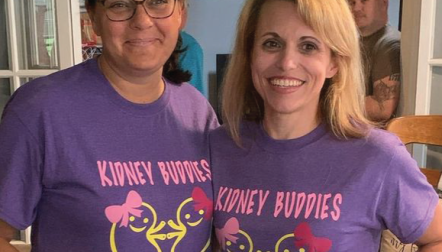
Press release
New American Kidney Fund Survey Highlights Importance of Patient-Practitioner Discussions About Anemia
Improved communication with practitioners key to patients' understanding of connection between anemia and kidney disease
ROCKVILLE, Md. (February 4, 2019) — A new survey by the American Kidney Fund (AKF) shows gaps in patient awareness and understanding of anemia, a serious health condition that is a common complication of chronic kidney disease (CKD) and end-stage renal disease (ESRD or kidney failure). The survey of patients and renal medical professionals also found that most practitioners believe that low health literacy among patients, along with patients feeling overwhelmed by other health conditions, serve as two significant barriers to discussing anemia with their patients. AKF's report on the survey findings is being released during American Heart Month to highlight the connections between kidney disease, anemia and heart disease.
Anemia — a deficiency of oxygen-carrying red blood cells in a person's body — is common in patients with CKD and ESRD, whose kidneys have reduced ability to send signals to the body to produce red blood cells. Anemia typically gets worse as kidney disease progresses, increasing a patient's already high risk for heart disease by causing the heart to work harder to provide enough oxygen to the rest of the body. Nearly all practitioners surveyed agree that anemia is a significant health issue for ESRD patients.
AKF's anemia survey report is based on online responses from 337 from renal practitioners (nephrologists, nurses, nurse practitioners and physician assistants) and 766 mailed responses from dialysis and kidney transplant patients. The survey's findings include:
- Despite anemia being a common complication of CKD and ESRD, 16 percent of surveyed patients were not sure they knew the effect of anemia on their health and 20 percent were unsure about the relationship between anemia and kidney disease.
- 19 percent of patients said they had never discussed anemia with their practitioner, while 9 percent were unsure.
- Of the patients who did talk with their doctor or nurse about anemia, only 37 percent said their practitioner consulted them about anemia treatment options.
- 73 percent of patients who said they received consultation from their practitioner about anemia treatment options strongly agreed they understood why they had been treated for anemia, compared to 42 percent of patients who had not received consultation.
- 99 percent of surveyed practitioners agreed that anemia is a significant health issue for dialysis patients — 85 percent believe it is often a significant health issue, while 14 percent believe it is sometimes a significant health issue.
- 86 percent of practitioners said patients' feeling overwhelmed with other health conditions was a significant barrier to discussing anemia with their dialysis patients about anemia, and 78 percent cited low health literacy as another barrier.
"This survey provides some valuable insights into patients' awareness of the connection between kidney disease and anemia, and practitioners' perception of their understanding," said LaVarne A. Burton, president and CEO of AKF. "Given the high rates of anemia in kidney patients, the survey indicates a need to overcome the barriers to practitioner-patient communication. These important conversations concerning treatment need occur much more frequently than our survey indicates."
Based on insights gained through the survey, AKF will expand its educational resources on anemia for patients and practitioners as part of its ACT on Anemia campaign, with the goal of helping to increase patient understanding of anemia and empowering patients to become knowledgeable, active participants in their treatment. The ACT on Anemia campaign, a finalist in the prestigious 2018 PM360 health care awards, was launched in 2016 and is made possible thanks to support from Akebia Therapeutics, Inc.
Washington, D.C.-based Urban Circle Consulting designed, administered and analyzed the results of the survey of two key groups of AKF constituents: medical practitioners active in the field, and patients living with kidney failure, including dialysis and post-transplant patients.
About the American Kidney Fund
The American Kidney Fund (AKF) fights kidney disease on all fronts as the nonprofit with the greatest direct impact on people with kidney disease. AKF works on behalf of 1 in 7 Americans living with kidney disease, and the millions more at risk, with an unmatched scope of programs that support people wherever they are in their fight against kidney disease—from prevention through transplant. AKF fights for kidney health for all through programs that address early detection, disease management, financial assistance, clinical research, innovation and advocacy. AKF is one of the nation’s top-rated nonprofits, investing 97 cents of every donated dollar in programs, and holds the highest 4-Star rating from Charity Navigator for 21 consecutive years and the Platinum Seal of Transparency from Candid, formerly known as GuideStar.
For more information, please visit KidneyFund.org, or connect with us on Facebook, Twitter, Instagram and LinkedIn.


